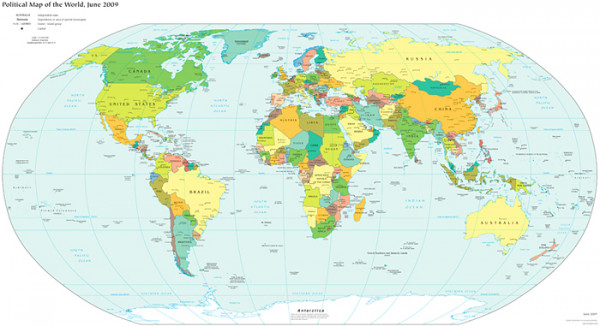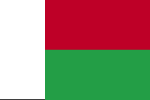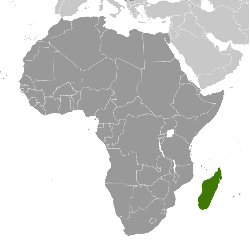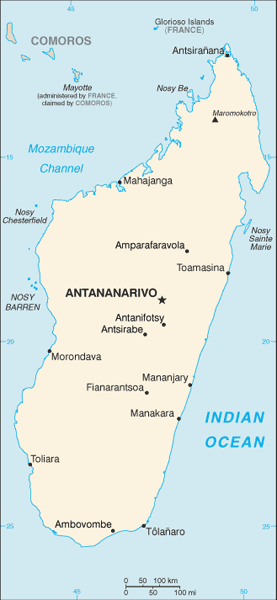Madagascar
Overview
| Flag |
|
| Anthem |
Ry Tanindrazanay malala ô! (Oh, Our Beloved Fatherland) |
| Capital |
Antananarivo |
| Largest city |
Antananarivo |
| Official language(s) |
Malagasy / French |
Demonyma name for a resident of a locality, often the same as the name of the people's native language
|
Malagasy |
| Government |
Caretaker government |
| Area |
587,041 km2, 226,597 sq mi |
| Population |
~ 21 million |
| Currency |
Malagasy ariary (MGA) |
| Internet TLD |
.mg |
Geography
Madagascar, or Republic of Madagascar, is an island nation in the Indian Ocean off the southeastern coast of Africa. The main island, also called Madagascar, is the fourth-largest island in the world.
Madagascar is divided into six autonomous provinces, and subdivided into 22 regions. The city of Antananarivo is the political and economic capital and the largest city of Madagascar. The city has a population of 903,450.
Society and culture
Malagasy culture reflects a
blenda mixture of two or more things of Southeast Asian, Arab, African and European influences.
Population
Madagascar's population is
predominantlymainly, to a great extent of mixed Austronesian (i.e. South-East Asian/Pacific Islander) and African origin. Those who are visibly Austronesian in appearance and culture are the minority, found mostly in the highland regions. Recent research suggests that the island was
uninhabitedno people living there until Austronesian seafarers arrived about 1,500 to 2,000 years ago.
Subsequentfollowing in time migrations from the East Indies and Africa
consolidatedto combine into a single unit; to group together this mixture, and 36 separate tribal groups
emergedto come into existence.
Languages
In the Constitution of 2007, Malagasy remains the national language while two other official languages are reintroduced: French and English. The Malagasy language is of Malayo-Polynesian origin and is generally spoken throughout the island. French is spoken among the educated population of this former French
colonya region or governmental unit created by another country and generally ruled by another country. English, although still rare, is becoming more widely spoken.
Religion
The main religions are Malagasy mythology and Christianity but there also minorities of other religions, most significantly Islam. Approximately 50% of the country's population practise
Malagasy mythologya traditional religion of the Malagasy people. About 45% of the Malagasy are Christian, divided almost evenly between Catholics and Protestants. Islam in Madagascar constitutes 10 – 15% of the population.
Government and politics
Although the present head of State is
self-proclaimedindicating that a claim or statement of status was made by the person who benefits from the announcement, Madagascar is usually a representative democratic republic. The Prime Minister of Madagascar is head of government and of a multi-party system.
Executiveenforcing laws and judicial decisions, and running the state day-to-day power is exercised by the government.
Legislativemaking, amending and repealing laws power is vested in both the government and the Senate and the National Assembly. The
Judiciarythe branch of government which is responsible for maintaining the courts of law and for the administration of justice is independent of the executive and the legislature.
Economy
Agriculture, including fishing and forestry, is a
mainstaythe chief support of the economy. Major exports are coffee, vanilla, sugarcane, cloves, cocoa, rice, beans, bananas, peanuts and
livestockfarm animals products. Madagascar is the world's largest producer and exporter of vanilla. Besides agricultural products, Madagascar's sources of growth are tourism, textile and light manufacturing exports and mining.







